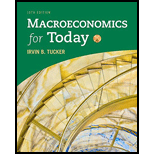
Shakespeare's admonition and the goldsmith evolution as fractional reserve banking.
Explanation of Solution
The barter system was the market exchange system that existed in the ancient period. According to the barter system, a commodity was exchanged with another commodity in the market. Thus, there should be double co-incidence of needs in order for exchange to take place in the market. This problem was corrected with the establishment of the money. Money is anything that serves as a medium of exchange in the market; it is unit of account as well as the store of value in the economy. There are many forms of money such as the paper currencies, metallic coins, bills and so on.
Gold was considered as money in the European nations in the middle ages. The preciousness of the metal and the heaviness made storage of the metal very difficult. This means that they needed a place to store the gold. The solution was to deposit the gold with those who work with it such as the goldsmiths. The paper receipt for the deposited gold started to be valued as money. Thus, the goldsmiths were the first bankers. In the initial ages, the goldsmiths followed the Shakespeare’s idea and they provided only the receipts for the gold that they had in their vaults.
Later, they were able to identify that whenever people were drawing their gold deposits from the goldsmiths, the new gold deposits were there to offset the drawings. Thus, they were able to lend out loan to the people from their gold deposits and identified that there is no requirement to keep 100 percent deposits with them. This started the evolution of the fractional reserve system where the banks were able to make the loans to the public only keeping a small fraction of the deposits as reserves with them. Thus, at the final stages, the goldsmiths did not follow the idea of Shakespeare, which never created new money and stimulated the economy due to the absence of the loans and the presence of 100 percent reserves.
Money: Money is anything that has basically three functions such as, the medium of exchange, unit of account, and store of value in the economy.
Want to see more full solutions like this?
Chapter 15 Solutions
MACROECONOMICS FOR TODAY




 Exploring EconomicsEconomicsISBN:9781544336329Author:Robert L. SextonPublisher:SAGE Publications, Inc
Exploring EconomicsEconomicsISBN:9781544336329Author:Robert L. SextonPublisher:SAGE Publications, Inc





